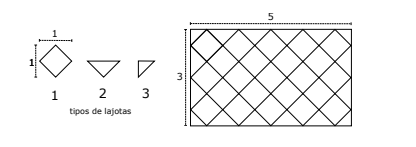Algorithm
Problem Name: beecrowd | 2786
Problem Link: https://www.beecrowd.com.br/judge/en/problems/view/2786
School Floor
By OBI  Brasil
Brasil
Timelimit: 1
The school intends to change the floor of a classroom and the principal took the opportunity to pass on a task to the students. The room has the shape of a rectangle of width L meters and length C meters, where L and C are integers. The principal needs to buy ceramic tiles to cover the entire floor of the room. It would be easy to calculate how many tiles would be needed if each tile were a 1 meter square. The problem is that the small flagstone that the director wants to buy is a square that is 1 meter diagonal, not sideways. In addition, she wants to fill the floor of the room with the diagonals of the tiles lined up at the sides of the room, as in the figure.

The store will supply tiles of type 1: whole; of type 2, which are of the half of type 1, cut along the diagonal; and type 3 slabs, which correspond to the half of type 2. See the three types of slabs in the figure.
It is very clear that 4 type 3 tiles are always needed for the corners of the room. The assignment that a principal passed to the students is the number of types 1 and 2 awards that are needed. In the figure, for L = 3 and C = 5, 23 of type 1 and 12 of type 2 were required. His program needs to compute, given the values of L and C, the quantity of type 1 and type 2 tiles.
Input
The first initial line contains an integer L (1 ≤ L ≤ 100) indicating the width of the room. A second line contains an integer C (1 ≤ C ≤ 100) representing the length of the room.
Output
Print two lines on the output. The first must contain an integer, representing the number of tiles of type 1 required. The second must contain an integer, indicating the number of tiles of type 2.
| Input Samples | Output Samples |
|
3 5 |
23 12 |
|
1 1 |
1 0 |
Code Examples
#1 Code Example with C Programming
Code -
C Programming
#include <stdio.h>
int main() {
int L, C, lajes1, lajes2;
scanf("%d %d", &L, &C);
lajes1 = (L * C) + ((L - 1) * (C - 1));
lajes2 = ((L - 1) * 2) + ((C - 1) * 2);
printf("%d\n", lajes1);
printf("%d\n", lajes2);
return 0;
}
#2 Code Example with C++ Programming
Code -
C++ Programming
#include <iostream>
using namespace std;
int main()
{
int l, c, t1, t2;
cin >> l >> c;
t1=(l*c)+((l-1)*(c-1));
t2=((l-1)*2)+((c-1)*2);
cout << t1 << endl;
cout << t2 << endl;
return 0;
}
#3 Code Example with Javascript Programming
Code -
Javascript Programming
const { readFileSync } = require("fs")
const [L, C] = readFileSync("/dev/stdin", "utf8")
.split("\n")
.map(value => Number.parseInt(value, 10))
function main() {
const typeAFloorsQuantity = (L * C) + (L - 1) * (C - 1)
const typeBFloorsQuantity = 2 * ((L - 1) + (C - 1))
// const typeCFloorsQuantity = 4
console.log("%d\n%d", typeAFloorsQuantity, typeBFloorsQuantity)
}
main()
